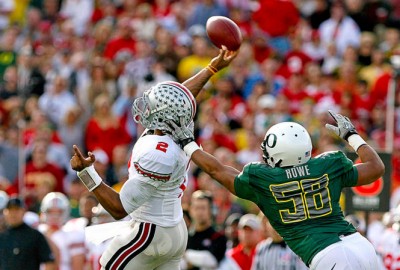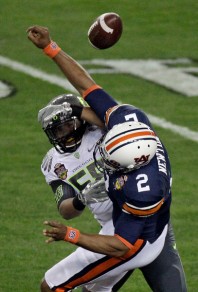On May 23rd, College GameDay’s Twitter feed sparked a Twittersphere mini-riot by asking the following:
“#Oregon has to win a National Championship to be considered an ELITE college football program… AGREE or DISAGREE?“
The question itself was clearly meant to incite discussion about Oregon’s place in college football’s hierarchy during the slow portion of the long off-season. If College GameDay is truly looking for answer though, they have the question inverted. It’s not whom Oregon has beat (or will beat) that is a valid measuring stick for Oregon’s success; it has been whom they have lost to that has been the appropriate measure of the validity of their elite status.
Since Oregon grabbed the Pac-10/12 crown on December 3, 2009, the Ducks have suffered only four losses in 24 games. All four teams that managed to defeat the Ducks have shared the same characteristics.
- Attained a #1 ranking within six games of playing Oregon.
- Used elite defenses, specifically elite defensive lines, to win.
- Had a player who was either a Heisman finalist, or became a preseason Heisman favorite the following season.
- Enjoyed a post-game narrative that they “dominated” Oregon despite the Ducks having multiple clear opportunities to win the game in the second half.
- Had a celebrated or talented starting quarterback who contributed little to nothing in the late stages of the game to help his team win, yet found his value as a player inflated as a result of the game.
The losses since Oregon captured the 2009 Pac-10 title:
2010 Rose Bowl vs. Ohio State
Following a humiliating 26-18 loss to Purdue, in which QB Terrelle Pryor (who strongly considered attending Oregon) threw passes like he was playing a backyard game of 500, Ohio State head coach Jim Tressel handcuffed Pryor’s passing, limiting him to seventeen passes per game in the final three contests of the regular season. Pryor played reasonably well in the Rose Bowl, going 23/37 for 266 yards, 2 TD, 1 INT, plus 20 rushes for 72 yards.
In the post-game discussion, Pryor was praised by analysts, remarking how he “ran all over Oregon,” while failing to notice that, save for a 24 yard run in the game’s first minute, Pryor’s other 19 rushes only go for 48 yards, for a “dominating” 2.5 yard per carry average.
It was perhaps not the yardage Pryor accumulated, but when he ran that hurt the Ducks the most, picking up multiple first downs on 3rd down when receivers were covered and it appeared Oregon had Pryor wrapped up in the backfield.
As that off-season progressed, Pryor’s performance was repeatedly compared to Vince Young’s 2006 Rose Bowl against USC, forgetting that Young had more passing yards (267) while rushing for 200(!) yards against a defense that produced more NFL players than the one Pryor faced.
Hyperbole spirals out of control during a July episode of College Football Live when Lou Holtz declares that Pryor should “already have his name inscribed on the Maxwell Trophy.”
Ohio State would start the season ranked #2 and climb to the #1 spot before a loss to eventual Big Ten champion Wisconsin ended their national title hopes. Pryor began the season as the Heisman frontrunner, but a poor start to 2010 in a season full of promising Heisman candidates resulted in him fading from relevance. Later that season, he became involved in a scandal from a FBI investigation into a Columbus tattoo parlor that would force him to leave campus disgraced, and the long-time OSU head coach Jim Tressel fired.
2011 BCS National Championship vs. Auburn
It may be hard to say that the eventual national champion in Auburn and the Heisman Trophy winner Cam Newton could get more of a boost from playing Oregon, but that’s what happened. The title alone is benefit for Auburn, who took advantage of some timely breaks (LaMichael James’ injury on the 1st and goal shutout, the Dyer call, a Cam Newton fumble recovered by Oregon with a clear path to return it for a touchdown ruled a sack, interception ruled incomplete, etc.) and managed to win despite not scoring a touchdown the final 32 minutes of the game.
The narrative quickly became how Auburn’s outstanding defensive line throttled Oregon’s offense, neglecting to remember how close Oregon was to blowing the game open on several occasions.
Newton had a statistically mediocre game, throwing 20/34 for 265 yards, 2 TD, 1 INT, 1 Fumble, and 22/64 rush yds (2.9 avg.). Those numbers would have been a lot worse had he not gained from having another fumble and interception waved off by the officials. Newton had a terrible fourth quarter, going 2/7 for 31 yds, with one Moshofsky Center banner-worthy lost fumble, and six carries for 26 yds. Despite that performance, Newton rocketed up draft boards, going from a mid-first round selection with “character issues” to the #1 overall pick. Today he is a glorified H-back running a full-time wildcat offense for the Carolina Panthers.
2011 Cowboys Classic vs. LSU
The first inclination is to say, “Jarrett Lee played well in this game.” Only Jarrett Lee wasn’t LSU’s starting quarterback, that distinction belonged to Jordan Jefferson (and Lee didn’t play well, going only 10/22 for 98 yards). Jefferson only lost his starting spot after an altercation at a Baton Rouge bar in August mere weeks before the game. Jefferson would eventually regain his spot, around the same time LSU’s once-dominant 2011 season began to fade.
The Tigers would go on to lose the 2012 BCS National Championship, with Jefferson’s quarterback play receiving much of the criticism for his inability to drive the offense across midfield.
2011 vs. USC
To say USC and Matt Barkley vaulted to prominence following this victory would be a gross understatement. Ranked 18th coming into the game at Autzen Stadium, USC used this victory and a blowout the following week over a resigned UCLA team to jump thirteen spots to #5 in the final regular season poll. The victory was a fortunate one for the Trojans, who were a missed field goal away from blowing a 24-point lead in the final 18:28.
Barkley had a statistically strong game (26/34 for 323 yards and 4 TDs) and piled up numbers early on, but failed to close out the game once Oregon woke up. Over the final 18:28, Barkley only went 5/8 for 61 yards, throwing a key interception, and contributing to a poor hand-off leading to a late redzone fumble.
Not only did Barkley not score a single point in the final 18:28, Barkley didn’t throw a single redzone pass. These late-game shortcomings in no way dampened Barkley’s enthusiasm, who still found the energy to conduct the band in the post-game celebration.
Despite saying he was “100 percent gone” following the next week’s victory over UCLA, Barkley chose to return to USC for his senior season, where he will be the unquestionable Heisman frontrunner heading into the 2012 season.
USC became the consensus preseason #1 and choice pick for this year’s national champion despite being down ten scholarship players and having to likely play Oregon twice this year, once in the Coliseum, and again in the 2012 Pac-12 Championship game.
Oregon’s detractors like to say that the Ducks’ reputation and status as one of college football’s elite is a product of hype; that the uniforms, the marketing, the facilities all are responsible for the perception of Oregon as an elite team rather than its on-field production. Yet in recent history, it is Oregon’s opponents who have been those to benefit from any such hype.
That is the measurement of an elite college football program, when a school’s name itself lends cache to a victory, a program is elite. When schools like Michigan or Texas lose, the triumphing school boasts its victory in a way it never would with a school like say Kansas State for example. Kansas State may have a better record, but it lacks the reputation to inflate the prestige of any team who may be victorious over them. But a win over Oregon does just that, and that’s why they are part of college football’s elite.
This is easier said than done, as the reason why Oregon has achieved such status is the fact that it is so difficult to beat them. Oregon boasts a 34-6 overall record in the three years Chip Kelly has been head coach, the only team in the country to have played in a BCS Bowl game the last three years–something only elite teams can claim.
Related Articles:
Chip Kelly Update: Everything's Good Again ...
Chip Kelly Update: Wailing and Gnashing of Teeth
Shock and Awe -- The Oregon Ducks' Football Hangover Effect
Despite Lopsided Score, Georgia State "Never Stopped Believing"
Hope Springs Eternal for Ducks
Incompetent Pac-12 Officials: How Do You Miss ALL of THIS?
Nathan Roholt is a senior writer and managing editor emeritus for FishDuck. Follow him on Twitter @nathanroholt. Send questions/feedback/hatemail to nroholtfd@gmail.com.


